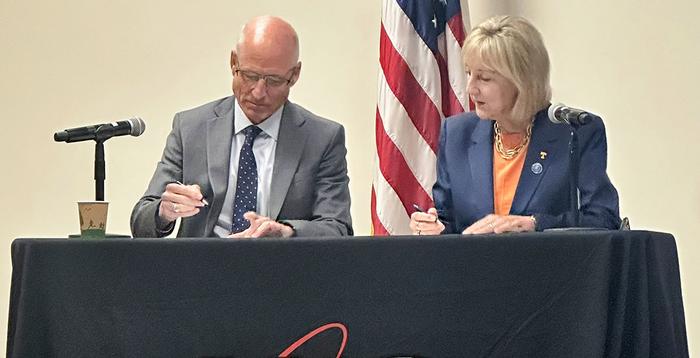In a groundbreaking partnership signaling a new era in national security and advanced manufacturing, the University of Tennessee, Knoxville (UTK), has joined forces with Consolidated Nuclear Security (CNS), the managing entity of the Y-12 National Security Complex. This collaboration, formalized through a memorandum of understanding signed on May 30 at the Tennessee Valley Corridor National Summit, aims to establish the National Security Prototype Center (NSPC) in Oak Ridge. The NSPC will serve as a nexus for pioneering solutions in high-precision manufacturing challenges critical to nuclear deterrence, national security, and nuclear energy sectors.
The NSPC is designed to transform cutting-edge scientific ideas into fully qualified prototypes, thereby accelerating the deployment of innovations that can have monumental impacts on both defense capabilities and energy security. CNS President and CEO Rich Tighe emphasized the complementary expertise this venture harnesses; Y-12 brings decades of classified manufacturing excellence, while the University of Tennessee contributes its robust research prowess in next-generation materials science and integrated manufacturing technologies. This synergy is poised to catalyze developments at the forefront of national security manufacturing.
Critical to the center’s mission is its focus on addressing the complexity of manufacturing processes that power nuclear deterrence systems. This involves leveraging novel materials engineered at atomic and molecular scales to enhance performance and resilience. The NSPC will apply state-of-the-art manufacturing methodologies, integrating digital twins — high-fidelity virtual models that mirror physical systems — and extended reality technologies, which include augmented and virtual reality tools, to optimize production pipelines and ensure uncompromising quality and precision.
UT Chancellor Donde Plowman underscored the university’s strategic position in this endeavor, highlighting its expansive research infrastructure covering advanced materials, AI-driven manufacturing automation, nuclear science, and cybersecurity. This partnership does not only reinforce the mission to safeguard the nation but also enriches the university’s role in training the next generation of scientists, engineers, and skilled technicians dedicated to national defense and energy innovation.
Beyond prototyping, the NSPC ambitiously expands into educational initiatives and workforce development. Tailoring hands-on training grounded in science, technology, engineering, and mathematics (STEM), the center will prepare a future-ready workforce capable of meeting the intricate demands of nuclear security manufacturing. This encompasses an emphasis on flexible curricula that respond to evolving industrial requirements, ensuring a continuous pipeline of talent skilled in both theoretical and practical aspects of high-consequence production environments.
A distinctive element of the partnership includes recruiting a Distinguished Chair for National Security Manufacturing. This leadership role will be pivotal in steering the NSPC’s scientific agenda and fostering effective collaboration between UT and Y-12. Holding appointments across both institutions, the chair will ensure seamless integration of research objectives, resource allocation, and policy alignment to maximize the center’s impact.
Equally transformative is the plan to establish shared state-of-the-art facilities dedicated to collaborative research and development. Supported by funding from the Department of Defense and the Department of Energy, these facilities will provide secure, cutting-edge environments allowing scientists and engineers from both entities to innovate and test manufacturing processes under conditions that closely simulate real-world operational demands.
The application of digital twins will be particularly crucial in the development and refinement of nuclear materials and components. These digital replicas simulate physical processes in real-time, enabling predictive analytics that reduce costly trial-and-error in prototyping and production. Coupled with extended reality, technicians and designers can visualize complex assemblies and procedures with unprecedented clarity, enhancing precision and reducing human error in critical manufacturing stages.
Mary Helen Hitson, NNSA Y-12 field office manager, highlighted the national and global significance of this collaboration. She pointed to the center’s role not just in advancing manufacturing technologies but also in creating a resilient infrastructure capable of responding swiftly to emerging security challenges, ranging from nuclear threats to energy supply risks. The NSPC is expected to become a leading hub where innovation and national security intersect.
This partnership also exemplifies a broader trend of multidisciplinary integration, where materials science, manufacturing engineering, computing, and defense strategies are intertwined to address increasingly sophisticated challenges. By pooling resources, expertise, and facilities, UT and CNS are positioned to leapfrog traditional barriers in nuclear technology development, delivering prototypes faster, smarter, and with heightened reliability.
Ultimately, the NSPC represents a paradigm shift in how national security challenges are approached through advanced manufacturing. It underscores the importance of university-laboratory-industry partnerships in driving innovation that is not only technologically superior but also responsive to policy and security imperatives. The center is poised to become a cornerstone for technological breakthroughs that bolster U.S. defense capabilities and reinforce energy infrastructure.
In conclusion, the establishment of the National Security Prototype Center stands as a testament to the visionary collaboration between academic excellence and operational mastery. With its commitment to innovation, workforce development, and the deployment of emergent technologies, the NSPC promises to play a pivotal role in securing the nation’s future in an increasingly complex global landscape.
Subject of Research: Advanced Manufacturing for National Security and Nuclear Energy
Article Title: University of Tennessee and Y-12 Forge National Security Prototype Center to Revolutionize High-Precision Manufacturing
News Publication Date: May 30, 2024
Web References:
https://www.y12.doe.gov/news/press-releases/y-12-and-ut-partner-solve-complex-manufacturing-problems
Image Credits: University of Tennessee




